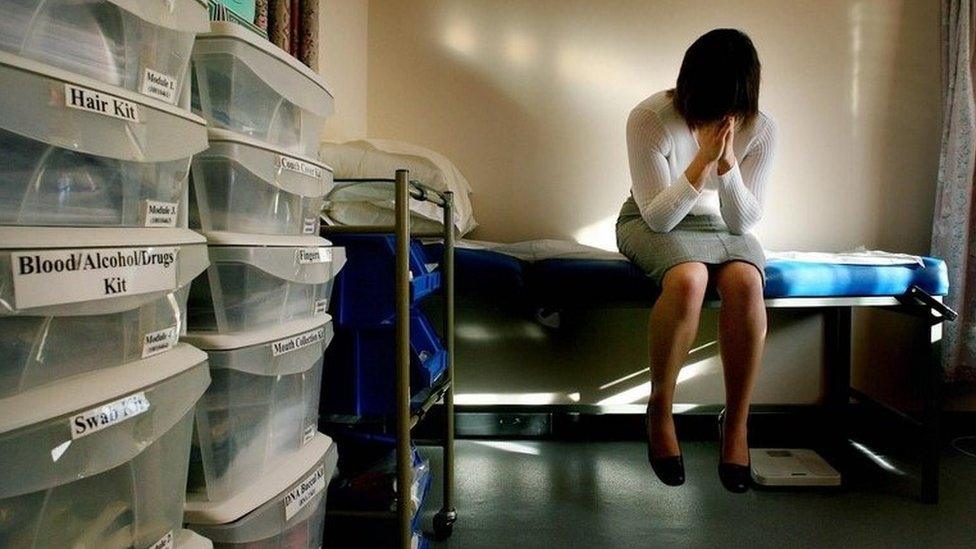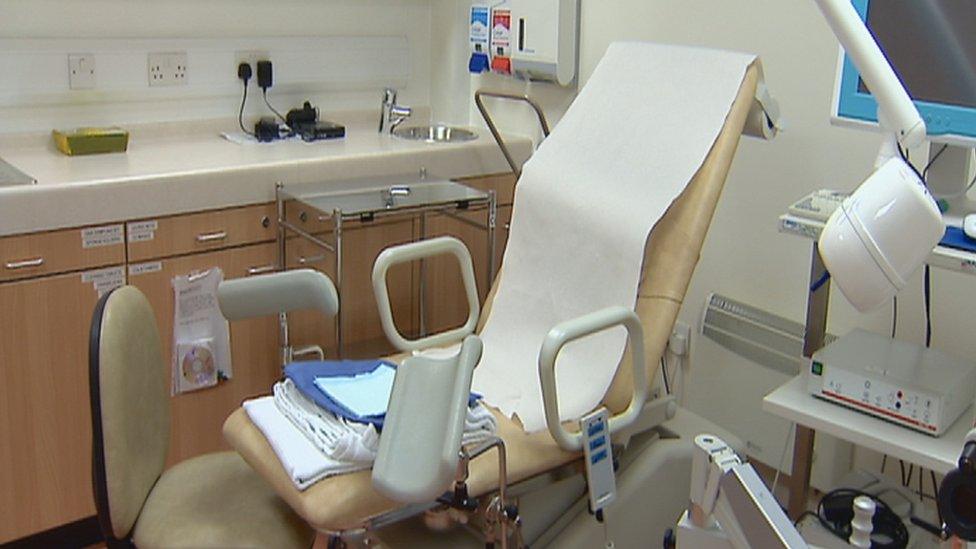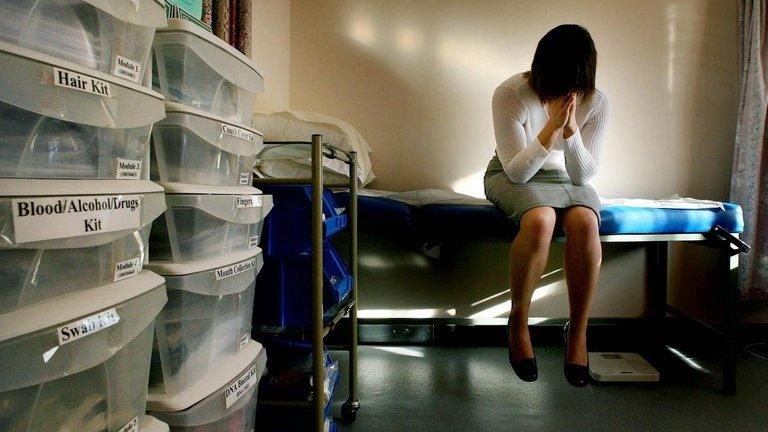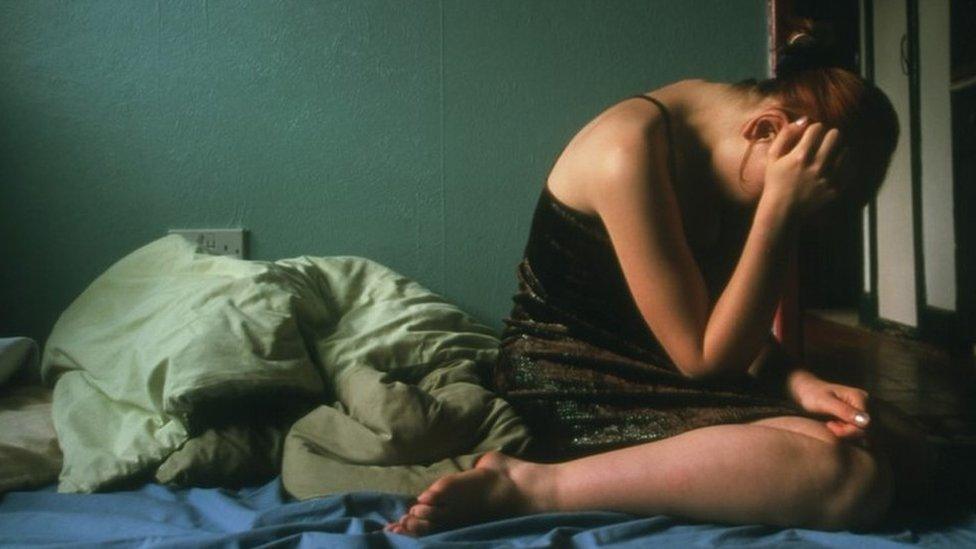Report says services for rape victims 'unacceptable'
- Published
The report said medical treatment of victims should take priority over the need to gather evidence for criminal justice proceedings
An independent watchdog has strongly criticised the treatment by the NHS and police of victims of sexual assault.
The inspector of constabulary (HMICS) said services offered to some victims were "unacceptable."
The review, external said they lagged behind the rest of the UK, with many victims being examined in police stations.
The Scottish government said it was establishing a group to improve the responses to victims of rape or sexual assault.
The report, a review of forensic medical services provided to victims of sexual crime in Scotland, examined how victims of sexual crime receive medical attention while forensic evidence is also gathered for possible prosecution.
'Significant variations'
It said while there are committed and dedicated professionals working towards delivering high-quality forensic medical examinations for victims, there were "significant variations" across the country.
Assistant Inspector of Constabulary Gill Imery, who wrote the report, said more investment was needed to fund healthcare professionals, including forensic nurses and the premises and equipment used for forensic medical examinations.
She said: "In cases where victims of sexual crime seek support but are unsure whether they wish to report a crime to the police, they must have the option of a forensic medical examination to capture forensic evidence should they subsequently decide to make a report.

"It is imperative there is clarity around the process of securing and retaining forensic evidence to allow for investigation at a later stage if the victim subsequently chooses to disclose details of the crime."
Her report said the the priority of forensic medical examinations should be to address the immediate health needs and future recovery of patients, with the contribution to potential criminal justice proceedings being a secondary consideration.
HMICS praised facilities offered at the Archway sexual assault referral centre (SARC) in Glasgow which offered a good service to victims.
'Unacceptable inequality'
But it said the clinic was not available for significant periods overnight and at weekends.
And it said the Archway was the only SARC in Scotland, compared with 43 in England and Wales.
Louise Raphael, a retired detective superintendent who chaired an expert working group in 2013 to agree new standards for the provision of forensic examinations, said this was "an unacceptable inequality."
She said: "One of the problems has been that NHS boards have seen the matter as a criminal justice responsibility.
"But the treatment of victims, particularly follow-on support, is more important."

Victims of sexual assault can be medically examined and treated at the Archway centre in Glasgow before speaking to police
She said that although the health and justice secretaries had accepted the standards suggested by the working group, they had not issued minimum standards to NHS boards - and there was no audit or inspection process such as that in England.
Rape Crisis Scotland said around half of forensic examinations in sexual assault cases take place in police stations.
'Unable to wash'
National co-ordinator, Sandy Brindley said: "Survivors also tell us of a lack of the most basic follow-up, for example the provision of emergency contraception.
"We hear of significant delays in examinations being provided, with people having to wait many hours, and in the worst cases days, for an examination, meaning they are unable to wash for considerable periods of time after being raped.
"There are particular issues for island communities, such as in Orkney and Shetland, where people generally have to travel to the mainland, with a police escort, to undergo an examination.
"Rape crisis workers on the islands tell us that this actively deters people from reporting sexual offences, as it significantly compromises their anonymity."
Justice Secretary Michael Matheson said: "The current provision of services for victims of rape and sexual assault is provided by motivated and committed professionals but more needs to be done to create a consistently high standard of service across Scotland.
"We know these individuals need the very best care at a time of great trauma and, while a forensic examination may be necessary for evidential reasons, there is a need to ensure the response is first and foremost health focused and victim centred.
"I am grateful that the chief medical officer has agreed to convene a group of key experts to ensure NHS boards are in a position to meet new National Standards and to examine closely the concerns and recommendations made by HMICS."
The report said a lack of paediatric services in some areas meant children who have been sexually abused are having to travel significant distances to be medically examined.
And it said adolescents can fall between adult and child services and forensic medical examinations can be delayed in the west of Scotland if the Archway facility was unavailable.
The children's charity NSPCC welcomed the report but said it was vital that any work undertaken to address its recommendations focuses on child, as well as adult victims of sexual assaults and reflects their different needs, particularly emotional support.
Matt Forde, national head for NSPCC Scotland said: "Police Scotland statistics show that 1 in 5 recorded rapes, and two-thirds of recorded sexual assaults, are committed against children under 16.
"However, research soon to be published by NSPCC Scotland, shows that in most areas the majority of children under 12 or 13 have no access to sexual assault recovery services.
"Recovery services for young people do not exist in every local area and the younger the child victim, the fewer the services available to them."
- Published7 March 2017

- Published8 February 2017

- Published23 January 2017
